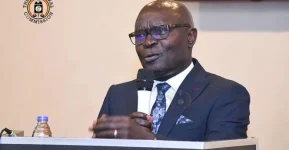The head of Uganda's Electoral Commission, Simon Byabakama, recently told lawmakers the country will spend UGX 838 billion on the 2026 elections. He shared these figures with the Legal and Parliamentary Affairs Committee in early April 2025. The biggest expense comes from ballot papers at UGX 158.2 billion. Sending results from voting places to the main counting center will cost UGX 26.6 billion. This money pays only for election tasks, not daily Commission work.
Election costs keep going up each time. The country spent UGX 476.58 billion in 2015-16. That jumped to UGX 765.7 billion for 2020-21. The government has given UGX 594.916 billion toward the UGX 774.632 billion needed for 2025-26. This leaves the Commission short by UGX 179.716 billion for key election tasks.
Why does each election cost more? Uganda has more voters than before. It needs more places where people can vote. The country added new cities. Prices have gone up. Elections use more computers and technology. The Commission must also run special group elections. Just fifteen years ago, the 2010-2011 elections cost only UGX 299.534 billion - less than half what they cost today.
Many important parts have no money set aside. Local Council I and II need funds. Women's councils need money. After the main elections, smaller elections will cost UGX 14.3 billion. Teaching voters about election rules needs UGX 3.018 billion. The government gave current local leaders extra time through a 2022 rule. Their replacements must be elected after the main voting but before May 12, 2026. The budget gives zero money for these crucial elections.
Byabakama said their first budget plan asked for UGX 140.801 billion in January 2025. However, this left out all costs for running the main elections—a UGX 623.904 billion mistake! The government later promised UGX 594.916 billion, but the Commission still needs UGX 179.716 billion more.
The Commission wants UGX 62.060 billion for a new main office. They lost their Kampala building because of road construction. They also asked for UGX 1.651 billion to build local offices and storage places. Past bills total UGX 5.998 billion. Last year, they should have received UGX 26.2 billion to start building, but that money never came.
Lawmaker Abdu Katuntu agrees the Commission needs its own building but questions the timing. He asks if building something big during a busy election planning makes sense. He worries about who would watch over construction when everyone focuses on election work. He also wonders if anyone would care about funding offices once voting ends and public interest fades away.
Other items without funds include staff raises at UGX 12.468 billion, running costs at UGX 6.887 billion, public meetings needing UGX 2.85 billion, and equipment costing UGX 3.349 billion. Workers have waited since 2019-2020 for promised pay bumps worth UGX 10.436 billion. Katuntu asked if someone might hold back money on purpose to rush the Commission during voting time.
These money problems led lawmakers to call for meetings between the Legal Committee, money managers, and election officials. Stephen Baka, who leads the Legal Committee, backed Katuntu's plan for joint talks. Both stressed the need to fix funding issues to make sure elections run smoothly with proper support.
Election costs keep going up each time. The country spent UGX 476.58 billion in 2015-16. That jumped to UGX 765.7 billion for 2020-21. The government has given UGX 594.916 billion toward the UGX 774.632 billion needed for 2025-26. This leaves the Commission short by UGX 179.716 billion for key election tasks.
Why does each election cost more? Uganda has more voters than before. It needs more places where people can vote. The country added new cities. Prices have gone up. Elections use more computers and technology. The Commission must also run special group elections. Just fifteen years ago, the 2010-2011 elections cost only UGX 299.534 billion - less than half what they cost today.
Many important parts have no money set aside. Local Council I and II need funds. Women's councils need money. After the main elections, smaller elections will cost UGX 14.3 billion. Teaching voters about election rules needs UGX 3.018 billion. The government gave current local leaders extra time through a 2022 rule. Their replacements must be elected after the main voting but before May 12, 2026. The budget gives zero money for these crucial elections.
Byabakama said their first budget plan asked for UGX 140.801 billion in January 2025. However, this left out all costs for running the main elections—a UGX 623.904 billion mistake! The government later promised UGX 594.916 billion, but the Commission still needs UGX 179.716 billion more.
The Commission wants UGX 62.060 billion for a new main office. They lost their Kampala building because of road construction. They also asked for UGX 1.651 billion to build local offices and storage places. Past bills total UGX 5.998 billion. Last year, they should have received UGX 26.2 billion to start building, but that money never came.
Lawmaker Abdu Katuntu agrees the Commission needs its own building but questions the timing. He asks if building something big during a busy election planning makes sense. He worries about who would watch over construction when everyone focuses on election work. He also wonders if anyone would care about funding offices once voting ends and public interest fades away.
Other items without funds include staff raises at UGX 12.468 billion, running costs at UGX 6.887 billion, public meetings needing UGX 2.85 billion, and equipment costing UGX 3.349 billion. Workers have waited since 2019-2020 for promised pay bumps worth UGX 10.436 billion. Katuntu asked if someone might hold back money on purpose to rush the Commission during voting time.
These money problems led lawmakers to call for meetings between the Legal Committee, money managers, and election officials. Stephen Baka, who leads the Legal Committee, backed Katuntu's plan for joint talks. Both stressed the need to fix funding issues to make sure elections run smoothly with proper support.












